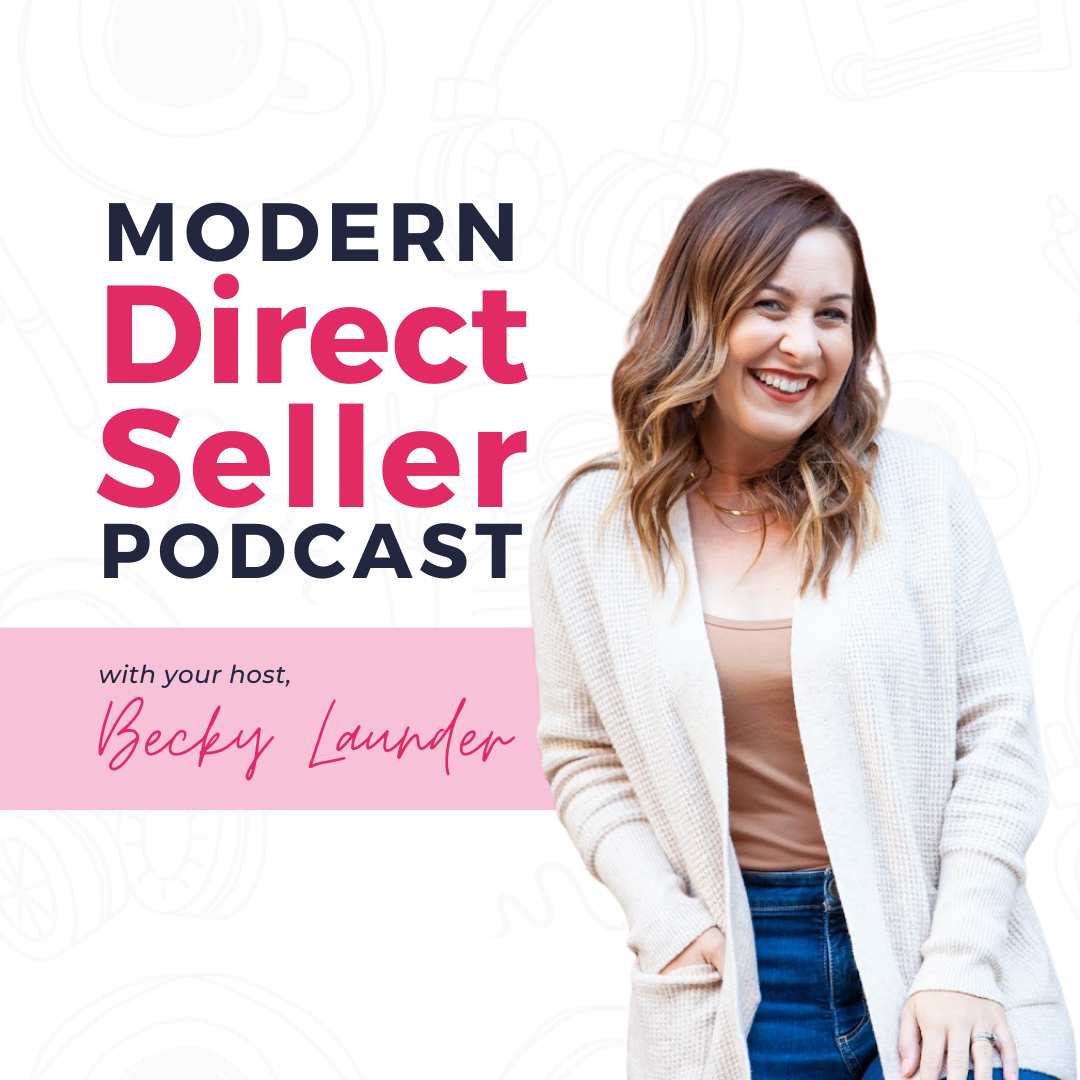Sometimes when we’re in the field, working to sell products and make connections, we get so focused on our own back office results that we forget to step back and see the direct sales industry as a whole. To help us see the big picture, today we’re joined by Peter Maddox, the president of the Direct Sellers Association of Canada! He chatted not only about the work that DSA Canada does and the way that they advocate on behalf of their member companies, but also about the impact of direct sales on the economy and the global interconnectedness of sellers. Whether you’re flourishing in the field or have grown to become an industry leader, listen in to learn the far-reaching effect of the work you’re doing!
Learn more about DSA Canada and their mission on their website, or find them across social media @DSACanada: LinkedIn, Facebook, YouTube, Instagram, and Twitter.
Time based notes:
- 1:30 Peter Maddox introduction
- 3:27 The direct sales big picture
- 6:57 Behind the scenes of DSA Canada
- 11:44 The socio-economic impact of direct sales
- 16:13 The DSA Code of Ethics
- 21:25 DSA Canada’s Direct Sellers Day
- 23:21 Rising trends in 2023
Discover the Impact of Direct Sales with DSA President Peter Maddox
Recently on the Modern Direct Seller Podcast, we were joined by Peter Maddox, the president of the Direct Sellers Association of Canada. He helped us take a step back from the sales we see every day and look at the direct selling industry as a whole! Whether you’re flourishing in the field or have grown to become an industry leader, read on to learn how your DSA is supporting you so that you can continue supporting your company, your economy, and other sellers around the globe.
Thanks for being here! Why don’t you tell everyone just a little bit about yourself, and how you kind of stepped into this role in leading DSA in Canada?
I mean, I started out with a sales and marketing background in education. So, my first job was actually as a rep for a drug company. So, there were two things that came out of that that have helped me here. One is that I understood a little bit about wellness products. And secondary, it gave me a sense that products need a great value proposition. And, I think that holds for direct selling even more so than in a lot of other areas of commerce.
So, that was in Australia, a lot of that early work, but I came to Canada about 15 years ago, and my career kind of zigged and zagged. I worked for a couple of industry associations—so organizations that represent either a group of people or companies or an industry or something like that. And then, around about five years ago, this role came up. I knew a little bit about direct selling from some personal experience, and honestly, the people are amazing. I work with great companies. They’re very welcoming. You can tell it’s a people industry, because people are anxious to help and to work together to achieve goals. So, that’s been really exciting for me. And, every day is different. Every year is different. So, it’s a super exciting role, and I look forward to the next five years.
I bet stepping into direct sales probably does have a very different feel, because I feel like there are extra stakeholders in direct sales. You have the independent consultants; you have corporate; you have investors and board members and vendors; and, I mean, the list goes on and on. So, it’s got to be an interesting spot to fit in and see the big picture of what’s happening, and the big trends, and the movement across the industry.
There’s certainly a lot of balls in the air at any one time, trying to keep people happy, and also trying to play a little bit of politics, as well. So, our core members are the direct selling companies. So, the companies that create the products and choose direct selling as their methodology to get that product to consumers.
But, at a secondary level a lot of the work we do is done in the interests of what we call “independent sales consultants,” which are all of the entrepreneurs out there who love the products and are selling them. So, when we go to the government and advocate on behalf of the industry, we’re not just advocating on behalf of the company, but we also want to make sure that the government or the regulator doesn’t bring in rules that stop those entrepreneurs doing what they love, which is talking about the products and the opportunity and going out and selling them.
And then, obviously, like you said, we have stakeholders. I like to think that the whole of Canada is a stakeholder, because what we do as an industry creates economic value and creates opportunity. A lot of those entrepreneurs who start off selling cosmetics or skincare or books or whatever it is, they go on to get into what I would consider more traditional entrepreneurship. They might say, “I want to start my own business,” and open a store, or something like that. We call it “micro-entrepreneurship.” And, I read somewhere that direct selling is “a great way to learn if you’re terrible at selling.” It’s a great way to invest a tiny bit of money to find out, “Hey, selling is for me,” or “It isn’t for me.” Some people start off slow, but really go with it. Other people start off amazingly well, and it creates almost a full-time or greater income for them. And, like I said, they can then maybe consider their own style, whether it’s direct selling or elsewhere. So, we cast our net wide, and we try to support all those people.
I love that you said that, because that’s a little bit of my story, right? I was in the sales field and had some success there, and then, things kind of grew and morphed, and now we have our own business. But, I say this all the time: I feel like direct sales is such a great training ground for entrepreneurship. You don’t have to worry about the production and fulfillment of the product you’re selling, but you do get to learn how to sell, and learn how to market, and learn how to network and talk to people. And, if you’re building a team, you’re learning leadership skills there. I think more than any corporate job I’ve ever had, direct sales and being in the field has given me the opportunity to learn a lot of things that maybe I wouldn’t have been exposed to or tried otherwise. So, I definitely see that happening a lot, where it leads into more of that micro-entrepreneurship, which is fueling the economy as well.
And, I think direct sellers don’t always see the work that you’re doing behind the scenes, right? We get to benefit from it, but we’re not always seeing the conversations happening as you’re working through rules and regulations and advocating on behalf of the industry. So, would you share a little bit about the mission and the role that you play?
So, we are the Direct Sellers Association of Canada. There are different names in different countries, but DSA is in about 65 countries around the world. They’re all independent organizations, but we do, you know, talk and share best practices.
And, as I mentioned, the people who pay their membership dues every year are those direct selling companies. And, our main stakeholder audience outside of the membership is government and regulators. Canada tends to be a little more highly regulated than, for instance, the U.S. market, particularly for wellness products; they need to be pre-approved by a health authority to make sure that the product claims you’re making are legitimate. So, we work really closely with that level of government.
We also talk to the media a lot. And, the media is important, because if there’s a vacuum in the media, and people have questions, and there are journalists looking for answers, if we don’t step into it and tell the truth, there are other people out there who are happy to step into that vacuum and talk about what they see as some of the negativities of the industry. So, we’ve made it our mission to really get into the media, and to speak to journalists and others, and to talk about the great stories—the individual stories—that come out of direct selling, but also the greater economic and social stories that come out of direct selling.
And then, our Code of Ethics is also a big thing for us. Ethical behavior is very important, particularly in this industry, just because of the nature of the networks. And, from the member company perspective, we all get together, and we have conferences and events, and they learn, and they share best practices. And, that’s pretty unique in direct selling. I’ve worked in other industries where competitors might smile when they’re in the room together, but then they leave and stab each other in the back. Here, a company will go, “Hey, we’ve got this problem with shipping, or with customs, or with retention,” or whatever it is. And, other companies will say, “Well, we had that problem, and this is what we did to fix it.” There’s this feeling of everybody pulling together in direct selling and helping out. So, that’s a really amazing part of this industry. And, we try to bring that together and create a forum for that to happen.
At the end of the day, an association isn’t me, or a building, or a staff; it’s the companies. So, they have to get that sort of value out of it.
That’s so cool that, from your perspective, you see that collaboration happening across companies. Because, most of our listeners, as direct sellers, they might see collaboration happening within teams in their company, or within their home office and a leadership team, or a lineage, but not at this higher industry level as other companies are being very intentional about working together.
So, if you don’t mind rattling off some stats for us, can you give us an idea of the socio-economic impact of direct sales?
Yeah, absolutely. Once a year, all the DSAs get together and do a whole lot of research with direct selling companies. And we use third-party researchers to find out a lot of the information, and the current numbers we have are for the end of 2021. So globally, annual sales across direct selling was $196.9 billion U.S., with over 128 million sales consultants. Which, it’s kind of hard to get your head around.
And, there’s a lot of traditional direct selling markets, like, obviously, North America and parts of Europe, but there’s been explosive growth in Latin America and Asia as well. So, that number is climbing fast, and you’ll find there are more direct selling companies coming out of those markets now, as well.
Canada is the 11th ranked direct selling market in the world. So, for us, we have about 1.37 million independent consultants in Canada, out of a population of around 40 million. So, that’s people who were active in 2021, and that’s everyone from someone who signs up and maybe sells some stuff to their sister, up to people who’ve made it into a full-time career, who have a team under them, who are probably more focused on team building and training and still doing some selling. So, that runs the full gamut. We find about 5% of people treat it as a full-time job, and the majority are kind of in that middle, where they do a few hours a week or a few hours a month or whatever it is, and maybe it helps to pay for a vacation or schooling or something like that. So, that’s where it really makes a difference in the economy.
In Canada, the annual sales are about 4.2 billion—that’s Canadian dollars. So, that’s probably like $3.7 or $3.8 billion in sales here in Canada. And, that leads to over $1 billion in taxes that are paid by our industry to the federal and provincial and municipal governments. That’s what builds schools and builds roads and builds hospitals. Whether you like paying taxes or not, some of the money we create goes to some good stuff, so we’re really proud of the impact we have on the economy in that regard. And, that’s not just the salespeople in the companies. They hire bookkeepers. There’s a truck driver who delivers the products. There are accountants. You know, there’s all sorts of people who are secondary to the industry; for every one job we create in the industry, we’re probably creating another two that flow on from that.
And, I’m happy to say that we talk with the government a lot, and they really get that. Every time we meet with government, they’ll be like, “Well, so, who’s in the direct selling industry?” And we’ll be like, “Well, it’s companies like this,” and they’ll be like, “Oh, my sister does that,” or “my mom used to do that.” So, everyone knows a company or a person, but when we put it together as a collective, it’s incredibly impressive.
I mean, that is a huge impact. And I know that was a lot of numbers, but I’m glad our followers can see that. Because again, usually, when you’re selling your products, you’re thinking about what you see in your back office. “My personal sales this month were $1,000.” We don’t think about how that adds up, and the fact that there are so many casual social sellers that might just selling a couple $100 a month or a couple $1,000 a year. But, the overall impact of that really, really does create a very impressive impact.
On the other hand, we know direct sales doesn’t always have the best reputation. So, when we think about the industry as a whole, and the Code of Ethics that is part of DSA Canada—and I think every DSA—what role does that play?
So, the beauty of this industry is that you’ve got millions of people who are passionate about products, and they’re out there talking about them, and they’re out there selling, and that’s amazing. It’s also kind of the weakness of the industry, because you’ve got all these passionate people out there talking, and it only takes one person to make a product claim or an income claim that stretches things a little bit. And then, someone grabs ahold of that, and that reflects back on the whole industry.
So, all of our member companies, when they join, sign up as signatories to our Code of Ethics. And, when they sign up, it impacts the independent sales consultants, as well. It puts some responsibility on them to do the right thing. I mean, at its core, the Code of Ethics says you’ll follow the law of the land in everything you do. But, beyond that, it’s about going above and beyond and doing the right thing. So, it’s never exaggerating income claims. It’s never saying, “Hey, this pair of leggings is going cure cancer.” Like, that’s extreme, but I’m sure someone has said it at some point. It’s about the company being true and honest to the consultants, whether they’re about to be recruited, or they have been recruited. It’s about the consultant being true to the customer and making legitimate claims about things. It’s also some administrative stuff—like buyback policies, for instance.
And, a lot of companies join us because of this Code of Ethics, but some of them have joined because their independent sales consultants have said, “Hey, are we a member of DSA Canada? We would really like it if we were, because people ask us about our commitment to ethics and our integrity.” So, it works in both directions, where companies will tell their consultants about the Code of Ethics, but also, the consultants will go to the company and say, “Hey, I really think this would add to our business and add to the value that we provide.” So, it’s not the sexiest thing we do, but it’s really core to everything about a DSA membership.
Absolutely. And, I think sometimes in the sales field, we know that there’s a compliance officer at our company that’s kind of this watchdog looking to see what you’re posting. But, they’re really trying to make sure that we maintain the integrity of the industry and are upholding that Code of Ethics that’s so important to follow. So, I’m glad we touched on that, because I know that sometimes there’s a perception of like, “That’s annoying,” or “There’s this person out there that keeps saying I can’t say it that way.” But, it really is important, because, you’re right. It only takes one person to say something the wrong way and make some false claim, and then it becomes, you know, headline news.
And, direct selling companies, it’s in their best interest that everybody who’s a consultant succeeds. So, they’re not doing things to make your life hard. They’re doing things because, over decades, they’ve built a system that works. And, part of that system that works is that people act in an appropriate way. You always have to look at the bigger picture.
Get more leads, customers, and teammates—in just five days—by joining us for the Modern Direct Seller Challenge!
Take Action: What is one way that your business can have a positive impact in your community?








0 Comments